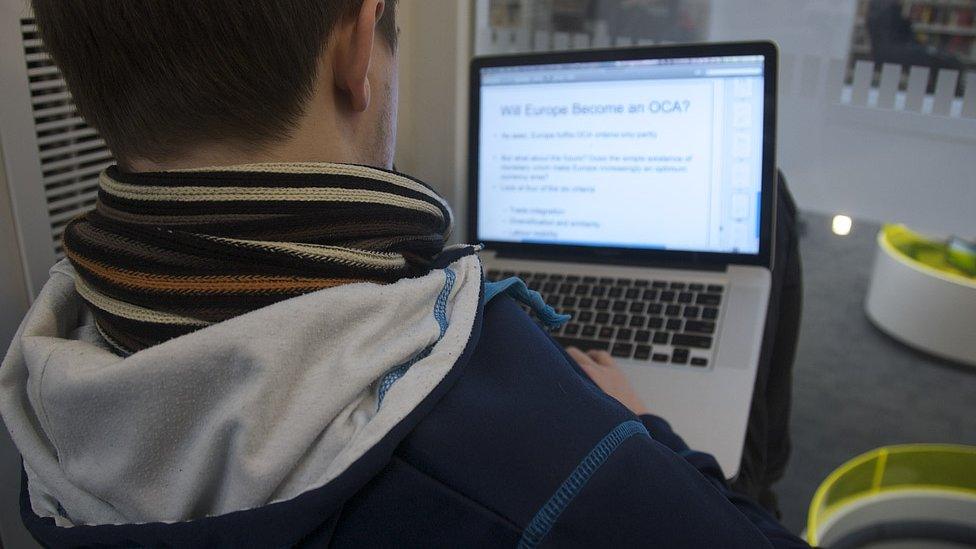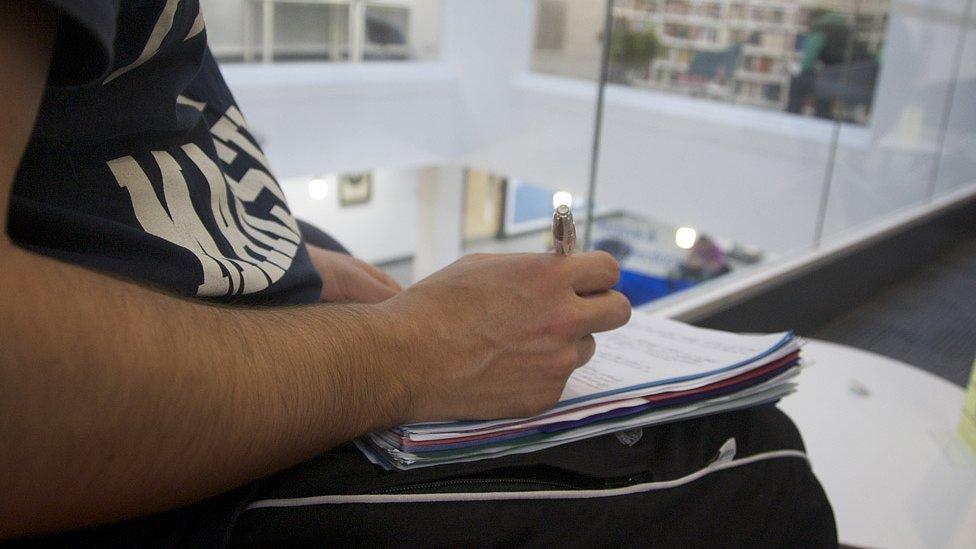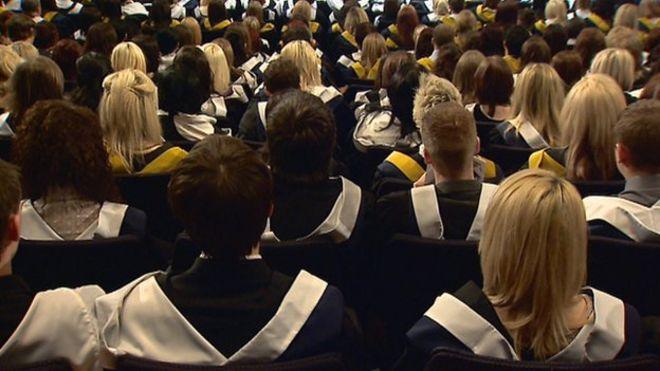How should Scottish universities reach the most disadvantaged?
- Published

Should university outreach schemes be aimed at all those in disadvantaged areas? Or should they simply target individuals?
BBC Scotland's education correspondent Jamie McIvor explores some arguments.

The target for universities is clear - 20% of students should come from the most disadvantaged fifth of Scotland by 2030. There are various interim targets along the way to show progress.
But living in a disadvantaged area, as defined by the postcode, is a very particular measure. Many youngsters who live in those areas do not face personal poverty or deprivation.
The main aim of the policy is, of course, to help those who have faced serious personal or financial challenges or who come from backgrounds where university itself would have been seen as unrealistic.
Critics of the use of a "postcode measure" may argue that it allows other youngsters to benefit from schemes designed to help those who are less fortunate.
For instance, they fear that a youngster could be admitted to university with poorer grades than others just because their address allows an admissions officer to tick a box.
The argument here is for a more personalised, perhaps subjective, approach to defining disadvantage. Questions might include whether the candidate was eligible for free school meals or whether their parents were long-term unemployed.
However, can a distinction be drawn between those who are actually disadvantaged and those who merely do not enjoy the advantages some children in more prosperous areas have? And can the area a young person lives in affect their aspirations regardless of personal circumstances?
As a a broad rule of thumb, a school's catchment area is reflected in the exam results - this is the main reason why so many in Scottish education believe raw exam data cannot be used to judge the quality of a school or its teachers.

It's often argued that some middle class children inevitably benefit from parental help or private tuition which makes it easier for them to achieve the top grades.
But might competition and friendly rivalry between high-achieving children in those areas also play a part? It's easy to imagine a youngster who is keen to make sure he gets an A in a subject because his friend expects to get one.
Despite the best efforts of many teachers, is there also a risk that an able youngster at a school where relatively few students achieve five Highers could coast? Perhaps being content with 5 C passes because few others even sat five Highers.
More worryingly - and again despite the best efforts of many teachers - is there even a risk an academically-able youngster could succumb to peer pressure and dumb down? Being smart or ambitious doesn't always make a teenager popular especially if some other children believe the person is "stuck up".
So is there a risk that able youngsters - because of a broader culture in the local community - may see a goal as unachievable or as "not for them"?
Some of the most prestigious university courses - for instance in law, medicine or dentistry - require outstanding exam results.

Candidates may often have to demonstrate personal qualities too or an admissions officer may be keen to hear about things they have done to prove their commitment to the subject. This could include relevant voluntary work or work experience.
There can be an impression that these courses could be beyond the reach of some youngsters simply because of their school or because their parents do not have the connections to arrange, say, work experience at a law firm.
An outreach scheme could help make the impossible possible - for instance the pupil could meet role models and the university could help them gain the relevant experience which would give them a good chance of applying successfully. It could give a youngster even more confidence and ambition.
It is true to say that some of the people who benefit from this sort of scheme may still have got on another university course with less demanding requirements and that they may not have faced poverty.
But an outreach scheme can still play a part in ensuring that individual courses or professions can become far more representative of society as a whole.
Some rural schools may offer an interesting example here.

Rural secondary schools are often extraordinarily diverse. At one extreme, some students may face poverty and disadvantage. At the other, some may come from wealthy backgrounds or - regardless of money - shoulder the high expectations of ambitious parents.
Teachers are aware of the challenge helping each child to the right destination - for some, an HNC course could be a real achievement while Oxford or Cambridge could be the ideal option for someone else.
This reminds me of a personal story. When I was in S4, I timidly mentioned to a visiting careers officer that I was interested in journalism.
He told me that I should try to get a job at my local paper once I'd done my O-Grades. (Incorrect advice anyway, although in the past some school-leavers were indentured by local papers.)
"Jamie is one of the most able boys in this year and will certainly NOT be leaving after his O-Grades!" exclaimed a teacher.
"If he's interested in journalism, I think we should be talking about how he could end up at the BBC, The Scotsman or Scottish Television."

BBC Scotland's education correspondent Jamie McIvor said he had always aspired to work for a broadcaster or national paper
The point the teacher was making was not, of course, that there was anything wrong with working at the local paper. In fact I did work there part-time while I was in S6 and my first proper job after university was there.
The point that concerned the teacher was that there would be youngsters from actively privileged backgrounds elsewhere who would be aspiring to working for a broadcaster or a national paper - as indeed I always did.
But without personal role models or first-hand knowledge these things can seem unachievable to some children or their parents.
Indeed, getting the marks for a place at university (of course, in those days fewer went to university) involved real personal commitment when only a handful of other people I knew were applying.
Ultimately there is no perfect black-and-white measure or definition of disadvantage.
The challenge for policymakers is to try to find ways of ensuring all children get the best start in life regardless of their parents' income or where they live.
- Published4 February 2016

- Published29 August 2017

- Published3 December 2012

- Published25 July 2012
